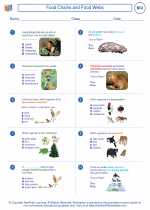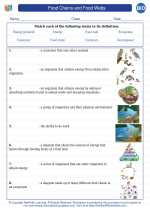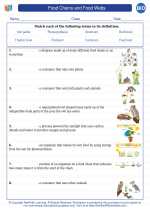Food Chains and Food Webs -> carbohydrates
Carbohydrates
Carbohydrates are one of the four major classes of organic compounds in living cells. They are essential for providing energy to the body and are made up of carbon, hydrogen, and oxygen atoms.
Types of Carbohydrates
Carbohydrates can be classified into three main types: monosaccharides, disaccharides, and polysaccharides.
Monosaccharides
Monosaccharides are the simplest form of carbohydrates and cannot be hydrolyzed to give a simpler sugar. Examples include glucose, fructose, and galactose.
Disaccharides
Disaccharides are formed when two monosaccharides are joined together by a glycosidic bond. Examples include sucrose, lactose, and maltose.
Polysaccharides
Polysaccharides are complex carbohydrates composed of long chains of monosaccharide units. Examples include starch, glycogen, and cellulose.
Functions of Carbohydrates
Carbohydrates serve several important functions in living organisms:
- Energy Source: Carbohydrates are the primary source of energy for the body.
- Structural Support: Some carbohydrates, such as cellulose, provide structural support in plant cell walls.
- Storage: Excess glucose is stored in the form of glycogen in animals and as starch in plants.
- Cellular Recognition: Carbohydrates on the surface of cells are involved in cell recognition and communication.
Importance of Carbohydrates in Biology
Carbohydrates play a crucial role in various biological processes:
- Cellular Respiration: Glucose, a monosaccharide, is broken down in cellular respiration to produce ATP, the energy currency of the cell.
- Photosynthesis: Plants convert carbon dioxide and water into glucose during photosynthesis, providing energy for the plant and oxygen for the atmosphere.
- Digestion and Metabolism: Carbohydrates are broken down in the digestive system and metabolized to release energy for cellular processes.
Study Tips
To effectively study carbohydrates, consider the following tips:
- Understand the structure and function of each type of carbohydrate.
- Learn the metabolic pathways involving carbohydrates, such as glycolysis and the citric acid cycle.
- Practice identifying different carbohydrates and their roles in biological systems.
- Use flashcards to memorize the structures and names of important carbohydrates.
- Relate the study of carbohydrates to real-life applications, such as nutrition and health.
[Carbohydrates] Related Worksheets and Study Guides:
.◂Biology Worksheets and Study Guides High School. Food Chains and Food Webs

 Worksheet/Answer key
Worksheet/Answer key
 Worksheet/Answer key
Worksheet/Answer key
 Vocabulary/Answer key
Vocabulary/Answer key
 Vocabulary/Answer key
Vocabulary/Answer key
